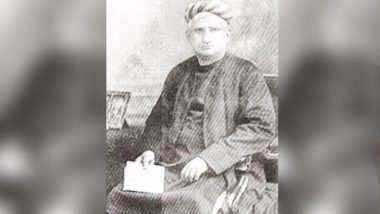Back in the 19th century, when India was still under the British reign, a strong voice had emerged championing the cause of nationalism. Sahitya Samrat Bankim Chandra Chattopadhyay who wrote the national song Vande Mataram which was composed by Kabiguru Rabindranath Tagore and it was a part of his novel, Anandamath (1882). In his epic, he very well set the background of Sannyasi revolt, the activities led by Hindu and Muslim ascetics in Bengal against the East India Company rule in the late 18th century. He was born in June 27, 1938. Every year on this day we celebrate his birth anniversary on and here is everything to know about the Sahitya Samrat.
Chattopadhyay stood as an influential figure in the Bengali renaissance after Anandamath came into the forefront and he kept the people of Bengal intellectually stimulated through his literary campaign. Bankim Chandra Chatterjee was born in a Brahmin family to Yadav Chandra Chattopadhyay and Durgadebi in a village at North 24 Parganas. Born to an orthodox family, Chattopadhyay was a bright student who was educated from Midnapore Collegiate School (then Government Zilla School). He became one of the first graduates from the University of Calcutta.
Just like his father, Bankim was appointed as the Deputy Collector of Jessore and was further promoted to Deputy Magistrate. But he could not hold his passion for writing. In this career, Sahitya Samrat wrote over 13 novels and many scriptures and some of his writings including novels and essays which eventually broke the traditional verse in Indian works providing an inspiration for authors across the country. His first fiction that appeared in print was Rajmohan’s Wife, which was written in English. It was regarded as the first Indian novel to be written in English. But Chattopadhyay turned his attention and focussed more in Bengali literature.
A common practice at that time, Chattopadhyay was married at the early age of 11 and had a son with his first wife, who died in 1859. He later married Rajalakshmi Devi with whom he had three daughters. Duregeshnandini (1865) and Kapalkundala (1866) were his fist publications which were hugely acclaimed and translated to other languages. Despite being a government servant, Bankim could see how British colonialism was affecting India’s rich civilization. The political novel, Anandamath calls for the rise of Indian nationalism. Bankim Chandra passed away in April 8, 1894 and he is regarded as one of the best novelists in India.
(The above story first appeared on LatestLY on Jun 27, 2018 11:38 AM IST. For more news and updates on politics, world, sports, entertainment and lifestyle, log on to our website latestly.com).













 Quickly
Quickly


